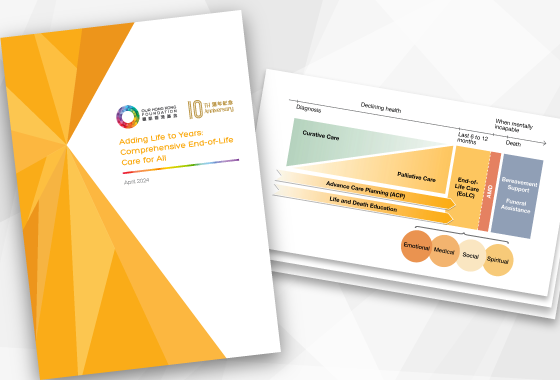OHKF Releases Healthcare Research Report
Fit to Practise:
Strengthening Hong Kong’s Doctor Workforce Today for a Better Tomorrow
(27 May 2021, Hong Kong) Our Hong Kong Foundation (OHKF) today releases a research report with a warning that Hong Kong’s longstanding doctor shortage crisis remains and is getting worse. The Report puts forward recommendations inspired by exclusive interviews with non-locally trained doctors practising in Hong Kong and a review of different jurisdictions’ policies related to registration and training opportunities for their respective overseas-trained doctors.
The Report highlights factors that facilitate or hinder qualified non-locally trained doctors who seek to practise in Hong Kong. It presents 22 recommendations to overcome these hurdles and revive the role of non-locally trained doctors in strengthening Hong Kong’s health workforce.
The OHKF calls for local authorities and institutions responsible for the recruitment and training of doctors to reach the common goal of ensuring a sufficient supply of doctors to deliver timely and quality healthcare services to the local population. Key hurdles that exist in our system relating to the recruitment, training, and accreditation of non-locally trained talent must be identified and overcome for Hong Kong to stand a chance of resolving the critical doctor shortage.
Chronic Doctor Shortage Crisis Extends Patient Waiting Time for Public Healthcare Services
In the past decade, Hong Kong has attempted a multifaceted approach to tackle the shortage of doctors, including increasing local medical training places, adjusting policies on admitting non-locally trained doctors into the system, and improving retention measures to lower attrition rates in the public sector. However, mechanisms currently in place have had limited impact. The Government’s latest Healthcare Manpower Projection 2020 found that Hong Kong’s doctor shortage gap has further widened in the short- to medium-term. There will be an expected shortfall of 1,610 doctors by year 2030 and 1,949 by year 2040. The OHKF believes that the actual shortage may be more severe than projected.
Hong Kong’s shortage of doctors has contributed to long waiting times for health services in the public sector, to the detriment of patients. For many specialty services, waiting times are simply prohibitive. The median waiting times for the specialties of ophthalmology, medicine, and otolaryngology, for example, can be as long as 123, 90 and 83 weeks respectively. Many patients face potential delays in treatment and deterioration of their conditions.
Hong Kong Has Lost its Leading Position in Doctor Supply
Hong Kong has not always been short of doctors. Prior to September 1996, qualified non-locally trained doctors from recognised Commonwealth countries could obtain Full Registration without going through a licensing examination. Non-locally trained doctors used to make up a significant proportion of Hong Kong’s doctor workforce, accounting for a yearly average of 53.8% of all newly registered doctors. Moreover, the number of doctors per 1,000 population in Hong Kong was once higher than that of other advanced economies such as Singapore.
Following the abolishment of the examination-free pathway in September 1996, Hong Kong experienced a drastic decrease in newly registered doctors. Notably, no substantial action was introduced to reinforce the supply of doctors, particularly non-locally trained doctors. Authorities have instead turned a blind eye to the increasing number of barriers to the admission of doctors into the system, rendering the local health system deficient. Once leading in the supply of doctors, Hong Kong now trails behind many global counterparts.
Today, non-locally trained doctors account for an annual average of approximately just 10% of newly registered doctors. Hong Kong’s doctor-to-population ratio has remained low. As of 2020, there were only 2.0 doctors per 1,000 people in Hong Kong. Faring worse than comparable Asian jurisdictions, such as Singapore (2.5) and other well-developed regions in the world (OECD countries average at 3.5), Hong Kong will need an addition of approximately 3,500 and 11,000 doctors to catch up with Singapore and OECD countries respectively.
Exclusive Interviews with Non-Locally Trained Doctors Shed Light on Options for Reform
The recommendations presented in the Report are inspired by exclusive interviews with non-locally trained doctors practising in Hong Kong. The work is supplemented with a review of different jurisdictions’ policies related to registration and training opportunities for their respective non-locally trained doctors. Barriers that Hong Kong must overcome to attract top quality doctors at different stages of their careers were identified, including: internship requirement barriers, unfair assessment standards posed by the local Licensing Examination, compromised opportunities for specialist training and career advancement, and lack of transparency in accreditation system for non-local qualifications.
Perspectives gathered in the interviews point out that Hong Kong has been less than receptive for admitting doctors into the system. Even people originally from Hong Kong who studied medicine overseas have encountered problems when trying to return home to practise. The OHKF puts forward 22 recommendations for reform, which is summarised below and detailed in the Appendix and Report.
Recommendations on Optimising Arrangements for Recruitment, Internship, Training, Accreditation, and Progression of Doctors with Non-local Qualifications
The OHKF believes that key stakeholders including the HKSAR Government, the Hospital Authority, the Hong Kong Medical Council, the Hong Kong Academy of Medicine, and the two local medical schools should work together to drive progressive reforms in addressing Hong Kong’s doctor shortage issue. This consortium of stakeholders should collaborate to map out the talent blueprint and optimise the processes for the admission, training, and accreditation of non-locally trained doctors without compromising opportunities for locally trained medical students.
The Government should mandate additional headcount for the Hospital Authority and the Department of Health in accordance to projected doctor shortfalls as calculated in the Food and Health Bureau’s Healthcare Manpower Projection 2020 for the global recruitment of doctors trained in or outside of Hong Kong based on merit. In particular, the Hospital Authority should target global recruitment efforts to fill posts across ranks and facilitate doctors to overcome any barriers arising from internship, examination, specialist training, and accreditation.
First, non-locally trained medical graduates without full-time internship experience should be qualified to take the local Licensing Examination. The Government should mandate medical institutions to offer internship placements for qualified non-locally trained medical graduates who are Hong Kong permanent residents unable to secure an internship placement in their place of training. In addition, the scope and assessment standards of the local Licensing Examination should be reviewed (Recommendations 2 and 6).
Second, to make Hong Kong more receptive to the admission of talented doctors, the Government should continue to optimise specialist training for non-locally trained doctors, including the offering of sufficient training places. On a similar note, the Hong Kong Academy of Medicine and the Hospital Authority should collaborate and consider offering integrated service contracts to non-locally trained doctors. For talents who have already obtained specialist qualifications overseas, the Government should optimise the accreditation processes and enhance the transparency of related criteria (Recommendations 3 and 4).
Third, the Government’s introduction of the Medical Registration (Amendment) Bill 2021 that creates a new pathway to admit qualified non-locally trained doctors will foreseeably facilitate the return of these doctors who are Hong Kong permanent residents to practise in Hong Kong. The OHKF calls for the list of recognised medical schools to be drawn up by the Special Registration Committee in a professional and objective manner. An appeal mechanism should also be devised to allow doctors who do not meet all the listed criteria to benefit from the new pathway. For example, the mechanism may review whether a well-qualified doctor who has served in the public sector under Limited Registration for a set period of time, yet do not meet the set criteria, may still eventually gain Full Registration via the new pathway (Recommendation 4).
Taking a Bigger Step Forward to Overcome Hong Kong’s Doctor Shortage
The OHKF views the Government’s proposed Medical Registration (Amendment) Bill 2021 as a good step forward but far from being sufficient to bridge Hong Kong’s severe shortfall of doctors over the past 20 years. It is important to look beyond this proposed Bill to improve policies related to existing Full and Limited Registration pathways for the admission of non-locally trained doctors. It is high time for all relevant authorities to collaborate in the formulation of a thorough reform plan that can turn the tide for Hong Kong to regain its leading position in doctor supply.
Mr Stephen Wong, OHKF Senior Vice President and Executive Director of Public Policy Institute, said: “All relevant authorities in Hong Kong should collaborate and remove regulatory barriers that stifle the flow of qualified non-locally trained doctors into Hong Kong’s health system in the past two decades, so that Hong Kong can catch up with other advanced economies in the basic doctors-to-population ratio which helps to enhance the quality of the overall medical system.”
Dr Pamela Tin, Head of Healthcare and Social Development Research of OHKF, remarked: “The Government's Medical Registration (Amendment) Bill 2021 is a step in the right direction to tackle Hong Kong’s worsening doctor shortage crisis. Our recommendations look beyond the proposed Bill and call for fairer opportunities to be made available for non-locally trained doctors without compromising opportunities for their locally trained peers. For the sake of improving health service provision in Hong Kong and for patients to receive timely care, hurdles that impede the entry, training, and accreditation of non-locally trained doctors in our system need to be overcome.”
Full report of Fit to Practise: Reviving the Role of Non-locally Trained Doctors to Strengthen Hong Kong’s Workforce for a Better Tomorrow
Chinese version: https://bit.ly/2TneXBG
English version: https://bit.ly/3ukPyoR
Full live press conference: https://youtu.be/5ATYbUIk-NA?t=369
.jpg)




